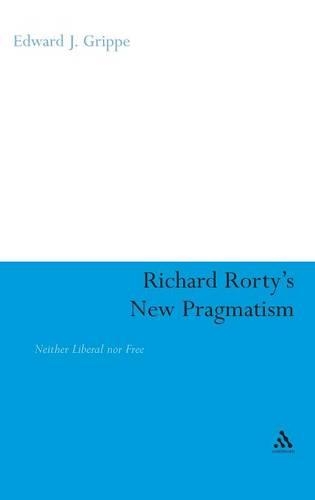
Richard Rorty's New Pragmatism: Neither Liberal nor Free
(Hardback)
Publishing Details
Richard Rorty's New Pragmatism: Neither Liberal nor Free
By (Author) Edward J. Grippe
Bloomsbury Publishing PLC
Continuum International Publishing Group Ltd.
23rd April 2007
United Kingdom
Classifications
Professional and Scholarly
Non Fiction
191
Physical Properties
Hardback
224
Width 156mm, Height 234mm
300g
Description
This book is a study of Richard Rorty's New Pragmatism on its own terms, and a critical analysis of its implications for contemporary thought. As an anti-foundationalist and a liberal, Rorty's version of pragmatism is designed to promote personal freedom and democratic solidarity. Having as his target the stultifying effects of Western philo-scientific tradition, encrusted with the barnacles of metaphysical essentialism and epistemic foundationalism, Rorty writes to liberate the contemporary mind and to promote the growth of individual creativity and social tolerance. Admirable as the goals of greater personal creativity and tolerant solidarity are, it is Edward J. Grippe's contention that Rorty fails to achieve either of them. Liberated from the notion of essentialism, Rorty develops a vision of self that is radically unfettered in its originality. So, to forestall the misanthropy that would inevitably emerge, a "solidarity of forbearance" is to be inculcated. But given his anti-foundationalist stance, Rorty cannot appeal to a rational consensus to ground tolerance. With only a Darwinian struggle between competing constructs, sophistic persuasion must be the deciding factor as to which narrative "works." And since there can be no ultimate or "final" vocabulary as arbiter, those that control the meaning of words control the basis for pragmatic conversation, i.e., what counts as "a working solidarity." Thus, the book concludes that Rorty's pragmatism is self-defeating, suppressing genuine conversation and ultimately constricting creativity.
Reviews
"A thorough, balanced critique of Rorty's pragmatism (or non-pragmatism) recommended for anyone seeking an overview of the present situation of pragmatism and philosophy in general" -Joan Stambaugh, Professor Emeritus, Hunter College, CUNY, USA -- Joan Stambaugh, Professor Emeritus, Hunter College, CUNY, USA
"This book is essential reading for those interested in Rorty." -Aaron James Landry, Philosophy in Review
"Grippe has a keen eye for fundamental tensions and contradictions within Richard Rorty's mix of antifoundationalism and idiosyncratic liberalism... Given Grippe's keen eye for contradictions, this book will be useful for graduate, research libraries. Summing Up: Recommended. Graduate students and researchers/faculty." D. Christie, CHOICE, June 2008, Vol.45 No.10 -- D. Christie
"There are few philosophers working today who exemplify the unyielding logical rigor of Ed Grippe's work... But what makes it a truly rare find is that he combines this rigor with such creativity and real-life relevance. I know of no philosopher on the contemporary scene that I would say is more relentless in this kind of interrogation, always demanding that the unexamined presupposition come into focus. This leads to work that sparks the reader's imagination without using any logical shortcuts, cheap rhetorical tricks, or unanalyzed fashionable turns of phrase..." Ralph D. Ellis, Professor of Philosophy, Clark Atlanta University, Editor, Consciousness & Emotion * Blurb from reviewer *
Author Bio
Edward J. Grippe is Coordinator of Philosophical Studies at Norwalk Community College, Connecticut, USA. He is the author of numerous articles in Philosophy in the Contemporary World, and elsewhere.
